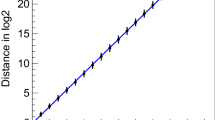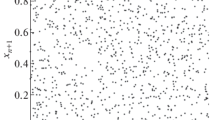Abstract
Lagged Fibonacci generators are widely used random number generators. Some implementations discard the least significant bit of their outputs, because their weight distribution has a strong deviation. But the degree of the improvement is unclear. In this paper, we give a method to compute the weight distribution of the n-th least significant bit of several pseudo random number generators for arbitrary n, generalizing the weight discrepancy test which was possible only for n = 1. The method is based on the MacWilliams identity over \(\mathbb{Z}/{2}^{n}\), and predicts the sample size for which the bit stream fails in a statistical test. These tests are effective to lagged Fibonacci generators such as random() in BSD-C library. For example, we show that the second least significant bit of random() will be rejected if the sample size is of order 104, while the sixth bit will be rejected for the sample size around 107.
Access this chapter
Tax calculation will be finalised at checkout
Purchases are for personal use only
Preview
Unable to display preview. Download preview PDF.
Similar content being viewed by others
References
Knuth, D.E.: The Art of Computer Programming, Volume 2: Seminumerical Algorithms, 3rd edn. Addison-Wesley, Reading (1997)
L’Ecuyer, P.: Uniform random number generation. Ann. Oper. Res. 53, 77–120 (1994)
L’Ecuyer, P.: Tables of maximally-equidistributed combined LFSR generators. Math. Comp. 68, 261–269 (1999)
L’Ecuyer, P., Simard, R.: TestU01: a C library for empirical testing of random number generators. ACM Trans. Math. Software 33, Art. 22, 40 (2007)
MacWilliams, F.J., Sloane, N.J.A.: The Theory of Error-Correcting Codes. I. North-Holland, Amsterdam (1977)
Marsaglia, G.: DIEHARD: A battery of tests of randomness (1996). http://stat.fsu.edu/~geo/diehard.html
Marsaglia, G.: Xorshift rngs. J. Statist. Software 8, 1–6 (2003)
Matsumoto, M., Kurita, Y.: Twisted GFSR generators. ACM Trans. Model. Comput. Simul. 2, 179–194 (1992)
Matsumoto, M., Kurita, Y.: Twisted GFSR generators ii. ACM Trans. Model. Comput. Simul. 4, 254–266 (1994)
Matsumoto, M., Nishimura, T.: Mersenne twister: a 623-dimensionally equidistributed uniform pseudo-random number generator. ACM Trans. Model. Comput. Simul. 8, 3–30 (1998)
Matsumoto, M., Nishimura, T.: A nonempirical test on the weight of pseudorandom number generators. In: Fang, K., Hickernell, F.J., Niederreiter, H. (eds.) Monte Carlo and Quasi-Monte Carlo Methods, 2000 (Hong Kong), pp. 381–395. Springer, Berlin (2002)
Panneton, F., L’Ecuyer, P.: On the xorshift random number generators. ACM Trans. Model. Comput. Simul. 15, 346–361 (2005)
Panneton, F., L’Ecuyer, P., Matsumoto, M.: Improved long-period generators based on linear recurrences modulo 2. ACM Trans. Math. Software 32, 1–16 (2006)
Vardy, A.: The intractability of computing the minimum distance of a code. IEEE Trans. Inform. Theory 43, 1757–1766 (1997)
Acknowledgements
This research has been supported in part by Grants-in-Aid for Scientific Research #24654019, #22740075 and #21654017.
Author information
Authors and Affiliations
Corresponding author
Editor information
Editors and Affiliations
Rights and permissions
Copyright information
© 2013 Springer-Verlag Berlin Heidelberg
About this paper
Cite this paper
Haramoto, H., Matsumoto, M., Nishimura, T., Otsuka, Y. (2013). A Non-empirical Test on the Second to the Sixth Least Significant Bits of Pseudorandom Number Generators. In: Dick, J., Kuo, F., Peters, G., Sloan, I. (eds) Monte Carlo and Quasi-Monte Carlo Methods 2012. Springer Proceedings in Mathematics & Statistics, vol 65. Springer, Berlin, Heidelberg. https://doi.org/10.1007/978-3-642-41095-6_19
Download citation
DOI: https://doi.org/10.1007/978-3-642-41095-6_19
Published:
Publisher Name: Springer, Berlin, Heidelberg
Print ISBN: 978-3-642-41094-9
Online ISBN: 978-3-642-41095-6
eBook Packages: Mathematics and StatisticsMathematics and Statistics (R0)




